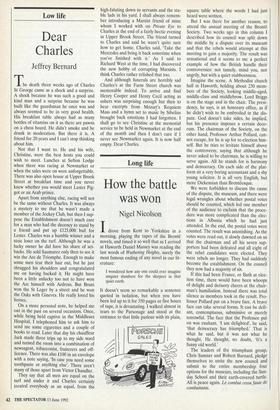Low life
Dear Charles
Jeffrey Bernard
The death three weeks ago of Charles St George came as a shock and a surprise. A shock because he was such a good and kind man and a surprise because he was built like the guardsman he once was and always seemed to be in very good health. His breakfast table always had as many bottles of vitamins on it as there are pawns on a chess board. He didn't smoke and he drank in moderation. But there it is. A friend for 20 years and I can't stop thinking about him.
Not that I want to. He and his wife, Christine, were the best hosts you could wish to meet. Lunches at Sefton Lodge when there was racing at Newmarket or when the sales were on were unforgettable. There was also open house at Upper Brook Street at breakfast time and you never knew whether you would meet Lester Pig- got or an Arab prince.
Apart from anything else, racing will not be the same without Charles. It was always a mystery to me that he wasn't made a member of the Jockey Club, but then I sup- pose the Establishment doesn't much care for a man who had the decency to stand by a friend and put up £125,000 bail for Lester. Charles was a humble winner and a stoic loser on the turf. Although he was a lucky owner he did have his share of set- backs. He sold Saumarez only then to see it win the Arc de Triomphe. Enough to make some men tear their hair out, but he just shrugged his shoulders and congratulated me on having backed it. He might have been a little unlucky too not to have won the Arc himself with Ardross. But Bruni won the St Leger by a street and he won the Oaks with Ginevra. He really loved his horses.
On a more personal note, he helped me out in the past on several occasions. Once, while being held captive in the Middlesex Hospital, I telephoned him to ask him to send me some cigarettes and a couple of books to read. Later that day his chauffeur Jack made three trips up to my side ward and turned the room into a combination of newsagent, tobacconist, fruiterers and off- licence. There was also £100 in an envelope with a note saying, 'In case you need some toothpaste or anything else'. There aren't many of those apart from Victor Chandler.
They say that all men are equal on the turf and under it and Charles certainly treated everybody as an equal, from the
high-faluting down to servants and the sta- ble lads in his yard. I shall always remem- ber introducing a Marxist friend of mine whom I worked with on Private Eye to Charles at the end of a fairly hectic evening in Upper Brook Street. The friend turned to Charles and said he wasn't quite sure how to get home. Charles said, 'Take the Mercedes and bring it back sometime when you've finished with it.' As I said to Richard West at the time, I had discovered the new hobby of corrupting Marxists. I think Charles rather relished that too.
And although funerals are horribly sad Charles's at the Farm Street church was memorable indeed. To arrive and find Henry Cooper and Henry Cecil acting as ushers was surprising enough but then to hear excerpts from Mozart's Requiem Mass and a hymn set to music by Sibelius brought back emotions I had forgotten. I shall go to see Christine at the memorial service to be held in Newmarket at the end of the month and then I don't care if I never see Newmarket again. It is now half empty. Dear Charles.


















































 Previous page
Previous page